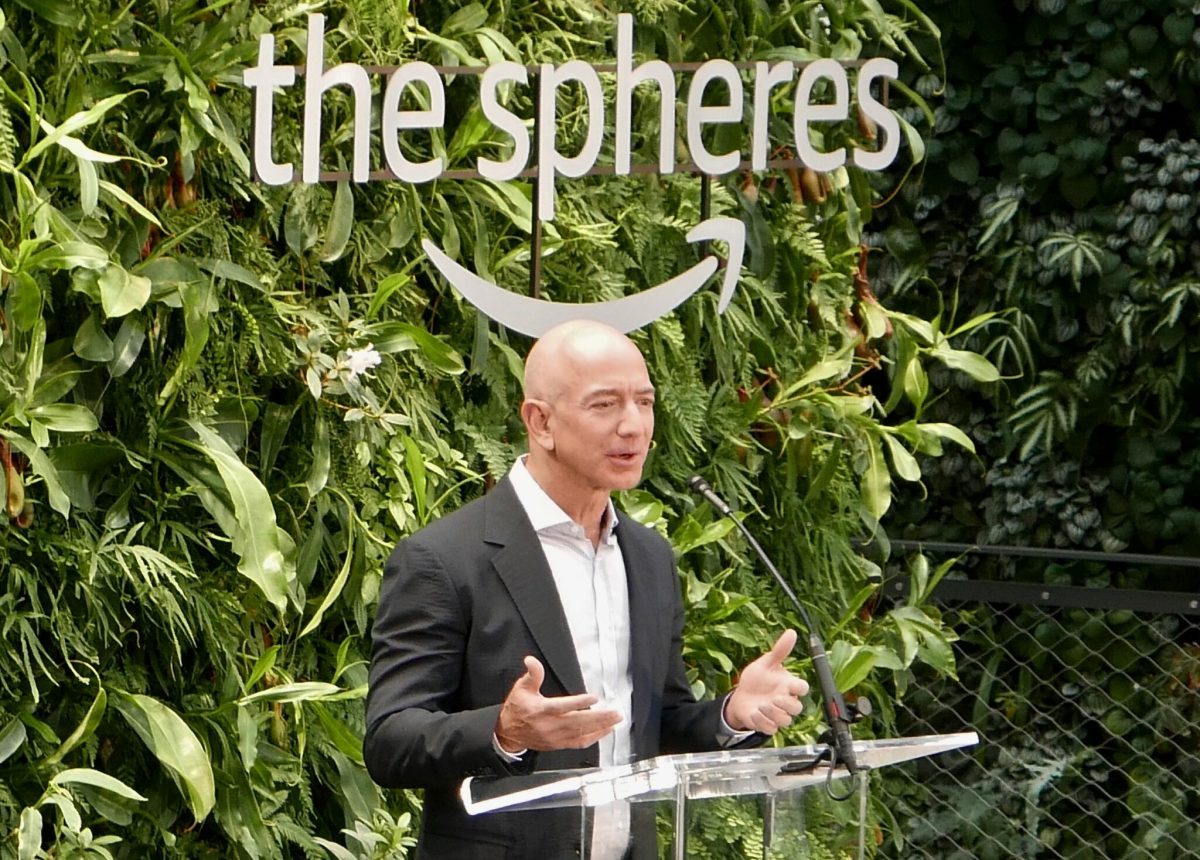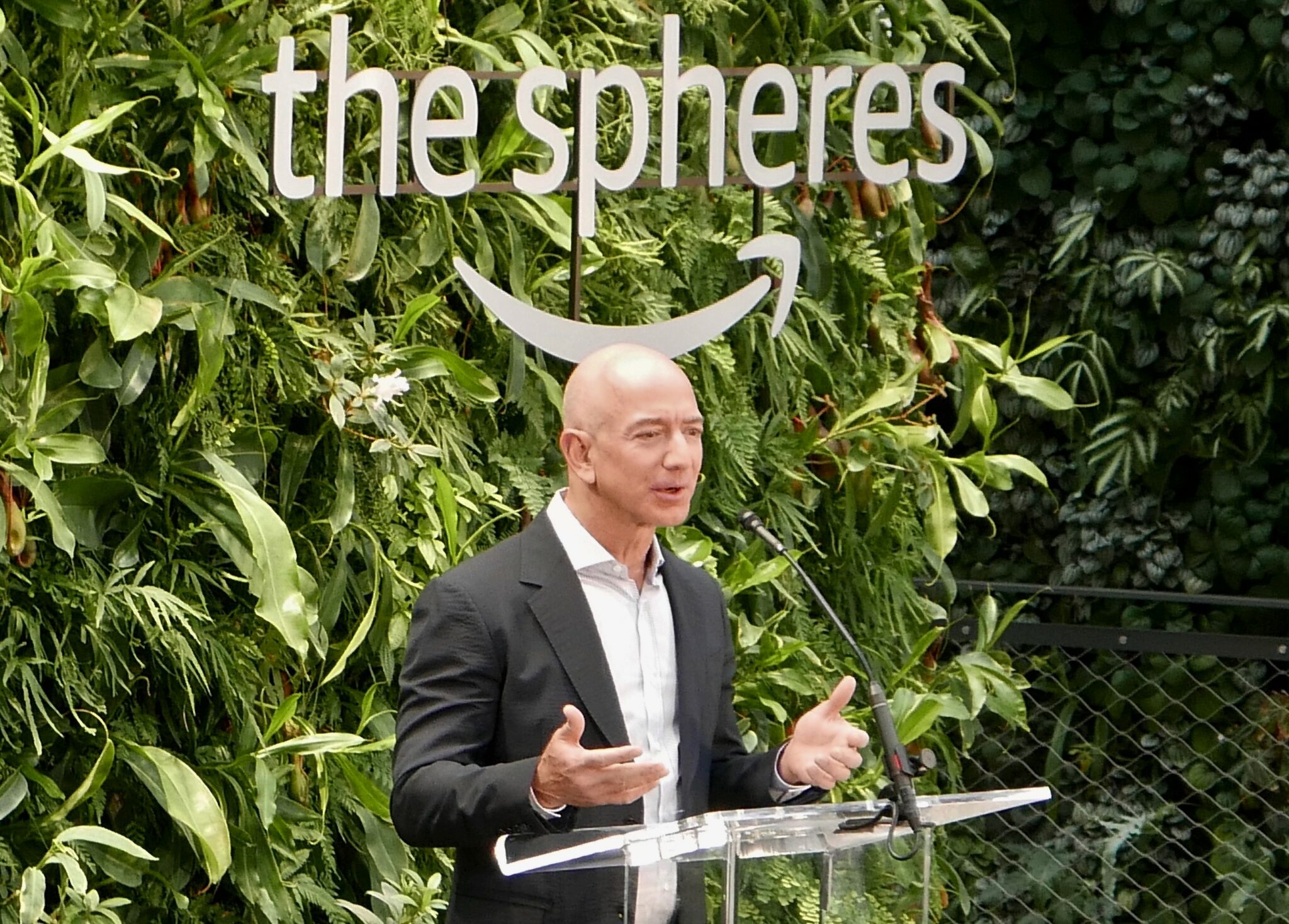The Daily Ten – Jeff Bezos announces winners for his $10 billion earth fund, CRE players join the SPAC boom, Airbnb IPO, “faux flexibility” in the workplace…

The Daily Ten
1. Bezos Earth Fund announces first grants totaling $791M of his $10B pledge to help planet | GeekWire
Jeff Bezos on Monday announced the 16 environmental organizations that will receive $791 million as the first round of grantees for his $10 billion Bezos Earth Fund.
The list is dominated by well-funded, long-standing organizations working to protect the climate and wildlife, including the Environmental Defense Fund, Natural Resources Defense Council, The Nature Conservancy, World Resources Institute and World Wildlife Fund. Each will receive $100 million, while 11 others landed grants between $5 and $50 million.
The fund was initially announced in February. The CEO of Amazon shared the news on the grantees via an Instagram post, in which he wrote: “I’ve spent the past several months learning from a group of incredibly smart people who’ve made it their life’s work to fight climate change and its impact on communities around the world. I’m inspired by what they’re doing, and excited to help them scale.”
While many of the groups on the list are international and national organizations, some of the dollars will flow to the Pacific Northwest, home of Amazon’s headquarters.
2. Shopping Malls Hope to Find New Life Fueling E-Commerce | WSJ
Tech vendors and analysts expect some of today’s failing malls to emerge as tomorrow’s warehouse delivery hubs
Mall operators, faced with a sharp downturn in foot traffic, are looking into the viability of converting empty commercial space into mini-fulfillment centers for their remaining retail tenants, technology vendors and analysts say.
“It’s a very real possibility,” said Max Pedro, president and co-founder of logistics technology maker Takeoff Technologies Inc. Mr. Pedro says at least one of the company’s clients, a large European mall landlord with hundreds of locations, is considering the strategy. He declined to name the client.
Malls have several advantages over outside, third-party fulfillment and logistics providers, including ready-made warehouse-sized spaces, central locations and a roster of on-site retailers, Mr. Pedro said: “It would be a huge missed opportunity.”
3. Airbnb Reveals Falling Revenue, With Travel Hit by Pandemic | The New York Times
The drop was $1.2 billion for the first nine months of 2020, in the first comprehensive look at the company’s finances as it moves to go public.
SAN FRANCISCO — Airbnb, the home rental service that disrupted the travel industry and was itself disrupted by the coronavirus, took a major step toward one of the year’s largest initial public offerings when it revealed declining revenue and growing losses in a prospectus on Monday.
The offering, which could value Airbnb at more than $30 billion and raise as much as $3 billion, will test investors’ appetite for hospitality-related stocks in a year when the industry has been battered and its future is uncertain. The company provides a marketplace for people to rent their homes, taking a percentage of the fees, and facilitates bookings for activities.
4. SL Green’s One Madison tower is a $2.3 billion bet against COVID-19| New York Post
Bucking fears of a bleak future for office buildings, SL Green is taking the plunge on a $2.3 billion, speculative project that bets on a revived city three years from now.
On Monday, the publicly traded developer started work on One Madison — a 1.4 million square-foot tower that superimposes 21st century environmentally attuned construction onto the original 19th century structure at Madison Avenue and East 23d Street.
The job won’t be finished until the fall of 2023, which gives the developer plenty of time to find tenants. Even so, it’s an audacious stroke by SLG and its joint-venture partners, Texas-based Hines and National Pension Service of Korea.
5. The risk of ‘faux flexibility’ in the post-COVID workplace | Fortune
Even before the pandemic, the way Americans worked wasn’t working.
“The corporate work environment is not sustainable for human beings and doesn’t comport with life,” says Atif Rafiq, president of commercial and growth for MGM Resorts.
Diane Hoskins, co-CEO of Gensler, whose company has been surveying workers for the past 15 years, says people spend about half their time at the office on “individual-focused activities”—something their shrinking workspaces do not foster.
“There’s been a real decline in how people perceive the effectiveness of the workplace to support the work they do every day,” says Hoskins. But as COVID-19 radically alters the way we work and live, this is a “reboot moment to think about what the workplace should be,” she says.
Rafiq and Hoskins spoke as part of a Fortune roundtable last week on how the pandemic is creating the biggest workforce experiment in modern history as employees have shifted from corporate offices to working from home.
6. A billionaire investor dubbed ‘the next Warren Buffett’ just revealed a $400 million bet on Bill Ackman’s SPAC| Business Insider
A billionaire investor heralded as “the next Warren Buffett” handed cash to hedge-fund manager Bill Ackman and “Moneyball” star Billy Beane last quarter, backing the pair to strike lucrative deals in the coming months.
Seth Klarman’s Baupost Group revealed in a regulatory filing that as of September 30, it held a roughly $400 million stake in Ackman’s Pershing Square Tontine, a special-purpose acquisition vehicle or “SPAC” that went public in July.
Ackman raised a record $4 billion from the listing to target “mature unicorns”, or buy a minority stake in a company valued between $10 billion and $15 billion.
Klarman’s hedge fund also disclosed a $52 million stake in RedBall Acquisition Corp., another “blank-check” company that counts Beane as its co-chairman.
As general manager of the Oakland Athletics, Beane pioneered the use of statistics in baseball to identify and recruit undervalued players. Author Michael Lewis told his story in “Moneyball” and he was portrayed by Brad Pitt in the movie adaptation.
7. Airbnb IPO could generate billions for the Bay Area. How will housing prices react? | San Francisco Chronicle
Airbnb unveiled long-anticipated plans to go public Monday, defying concerns that the coronavirus pandemic had permanently hurt its business of short-term rentals and revealing the underlying strength of the San Francisco company’s business.
The stock offering, which could take place as soon as December, will likely make Airbnb’s founders and investors billions and turn many employees into millionaires. While taxes on their windfall and spending by the newly wealthy will bolster state and local coffers at a time when such revenue is badly needed, it is unlikely to cause more than a blip in the already hot local real estate market, observers said.
CEO Brian Chesky had said Airbnb intended to go public in 2020, but the filing was delayed by the pandemic. The company raised $2 billion from investors in April and laid off 1,900 employees in May. Travel rebounded, as did Airbnb’s bookings, with many customers opting for closer-in destinations reachable by car rather than flying to far-off destinations and staying at hotels or resorts.
8. Is your landlord spying on you with “smart home” tech? | The Legal Examiner
These days, your landlord doesn’t have to peep out the window like Gladys Kravitz to keep tabs on your every move. Constant surveillance is just a click and ‘two-day shipping’ away.
From the Ring video doorbell to nanny cams to key fobs, the Internet of Things and “smart home” technologies have made it easier than ever to gather data on consumers. And data privacy law simply hasn’t caught up. “It’s still the Wild West,” said Katie McMahon, who wrote a note on smart home privacy for the Fordham Law Review in 2018.
Organizations like Landlord Tech Watch have flagged this surge in “proptech” (short for property technology) as a tool of gentrification. New York City has become something of a proving ground for legal cases where proptech and privacy rights clash — in part because NYC landlords have so much to gain by shedding themselves of a tenant with a sweet, rent-stabilized deal.
9. CRE Firms Join the SPAC Boom | GlobeSt.com
Sponsors such as Tishman Speyer, CBRE and Sam Zell have all launched blank check companies in recent months.
One trend that emerged this year was the rediscovery of the special purpose acquisition company, sometimes called a blank check company. So far, 178 SPACs have launched this year, according to SPACInsider, compared with 59 last year and 46 the year before. There are many factors driving SPACs’ newfound popularity—factors that are appealing to the commercial real estate industry as well. In recent months a handful of CRE SPAC offerings have come to the market, the latest being Tishman Speyer’s $300 million SPAC, which closes today.
To get into why and which CRE companies are tapping into this model, a brief explanation of what they are may be in order for some. SPACs allow companies to go public by bypassing the traditional IPO process. They are publicly-traded shell companies that are formed to pursue deals in the private sector by raising capital in an IPO and then searching out acquisition targets. The acquired companies then use the SPAC to sell shares to the public.
There are many reasons why companies are pursuing SPACs right now. They come with less risk for private firms to go public. The sponsors can access attractively-priced capital. SPAC combinations take on average 6 to 8 months to complete once a merger agreement has been reached, according to GigCapital, significantly shortening the time-to-market for target companies. They also are able to take advantage of price differences between private and public markets, writes John M. Mason of New Finance for Seeking Alpha.
10. Predatory and Opportunistic’: Southwest Airlines Seizes the Moment as Rivals Struggle | WSJ
Through its history, the no-frills airline has leapt at opportunities to expand into new cities. It’s doing it again.
The pandemic is forcing many airlines to defend their turf. Southwest is using it to invade.
Even as air travel languished in this fall, Southwest Airlines Co. executives fanned out to cities from Palm Springs, Calif., to Sarasota, Fla., to scope out potential new markets. The airline is adding four more cities to its network this year and announced plans for another six in 2021. And it’s looking for more. It hasn’t added airports this quickly since integrating with AirTran Holdings, which it bought in 2011.


